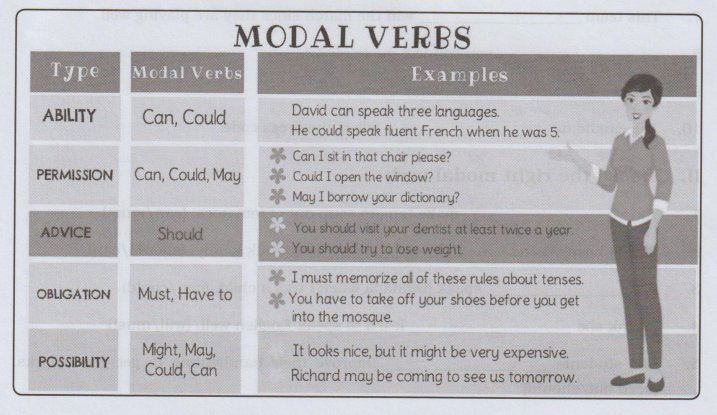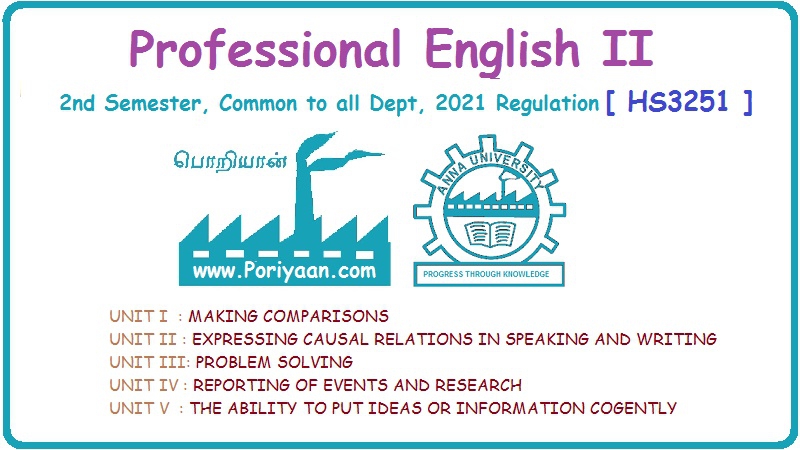Professional English: Grammar: UNIT 4
Modal Verbs
Grammar
The verbs can, could, may, might, will, would, shall, should, must and ought are called MODALS OR MODAL VERBS or MODAL AUXILIARIES.
CHAPTER - 16
MODAL VERBS
The
verbs can, could, may, might, will, would, shall, should, must and ought are
called MODALS OR MODAL VERBS or MODAL AUXILIARIES.
The
verbs do, does, did, have, has, had, am, is are, was, and were are called
auxiliary verbs.
1.
'can' is used to express ability or capacity.
Eg.
A candidate who can speak English naturally finds interview easier.
2.
'could' is used as the past equivalent of 'can'. It refers to the ability in
the past.
Eg.
I could swim across the river but not now.
'could'
is used for polite request.
Eg.
Could you please pass that glass of water?
3.
'may' is used to express permission.
Eg.
May
I come in ?Ma'm
'may'
is used to express possibility (50%)
Eg.
It may rain today.
'may'
is used to express a wish.
Eg.
May God Bless you, my child.
4.
'might' is used to express lesser possibility
Eg.
It might rain. (30%)
'might'
is also used as the past equivalent of 'may'
Eg.
She said that she might bring her vocabulary book the next day.
5.
'will' is used to express volition (willingness)
Eg.
I will carry your paper bundles. (willing to)
'will'
is used to express habit.
Eg.
She will talk about nothing for hours.
'will'
is used to indicate an invitation or request.
Eg.
Will you have a cup of coffee?
Will
you please lend me your scooty for a day?
6.
'would' is used as the past equivalent of 'will'
Eg.
She asked if she would lend her scooty for a day.
'would'
is used after wish which expresses a strong desire.
Eg.
I wish I were a bird.
Eg.
If I were the Chief Minister, I would plant more number of trees.
7.
shall' is used to express pure future.
Eg.
I shall be eighteen next birthday.
'shall'
is used in questions.
Shall
I open the door for you since you are carrying bags.
8.
'should' is used as the past equivalent of 'shall'
Eg.
They insisted that they should be given promotion.
'should'
is used to express duty/obligation.
Eg.
We should obey the laws.
9.
'must' is used to express necessity or obligation.
Everyone
must have aadhar card.
'must'
is often used when the obligation comes from the speaker.
I
think I must do exercise.
I
think I must cultivate food discipline.
'must'
expresses logical certainty.
Living
amidst harsh people must be difficult.
He
must have boarded the train by now.
'ought
to' expresses oral obligation or desirability.
We
ought to follow the rules.
We
ought to help the patients.
'ought
to' can also be used to express probability.
The
rates ought to be decreased.
The
novel ought to be interesting.

Professional English: Grammar: UNIT 4 : Tag: : Grammar - Modal Verbs
Related Topics
Related Subjects
Professional English II
HS3251 2nd Semester 2021 Regulation | 2nd Semester Common to all Dept 2021 Regulation
